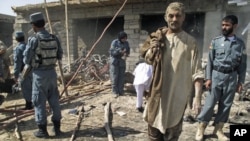Statistics posted on iCasualties.org, an independent monitoring group, show that more than 2,700 foreign troops have died during the past 10 years in Afghanistan. But since the start of the decade-long war, Afghans themselves have suffered the brunt of the conflict with thousands of civilians being caught in the cross-hairs of the fight.
The start of the U.S.-led invasion against the Taliban 10 years ago marked the beginning of a new chapter in Afghanistan. Representatives with human rights groups say it should have ushered in a time of peace and prosperity after decades of war.
"After the Taliban regime was toppled, the public assumed that the wars had ended and innocent people would not be harmed and killed anymore," said Ahmad Nadir Nadiry, Afghan Independent Human Rights Commission.
But those hopes did not last long, as insurgent and coalition attacks resulted in civilian deaths.
Four years ago, the United Nations' Assistance Mission to Afghanistan started keeping track of the casualties.
Each year, the civilian death toll has risen, from more than 1,500 dead in 2007 to more than 2,700 in 2010. And in the first half of this year, the U.N. office reported there were 2,400 civilians killed in war-related incidents, causing grief to new families.
"Karzai has to name a street after my son," said one Afghan mother. "He was killed in the war. Karzai needs to make up for our lost income."
U.N. officials admit the process for recording casualties is not perfect.
Nazifullah Salarzai, United Nations Assistance Mission, said, "I think civilians should receive a lot more information about where the casualties occur, the areas they should avoid, and who commits the attacks targeting civilians."
A recent U.N. report said in the first eight months of 2011, the average monthly number of violent incidents in Afghanistan was more than 2,100, a nearly 40-percent increase from the same period a year earlier.
And as insurgents conduct even more complex suicide attacks, fears remain that the Afghan people's suffering is far from over.
VOA Afghan Service's Akmal Dawi contributed to this report.




